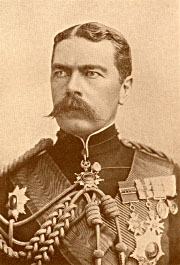4.01.2008
Sadr: Mad Mullah gets more Juice
>

According to the LA Times, al-Sadr, the bearded, red-around-the-eyes firebrand cleric has won the latest round of poker against Maliki. Generally, we're not focused on politics - however, this might be an opportune time to talk about the history of "mad mullahs" in general. Skipping the Crusades, which featured a collection of 'crazed' holy men on both sides, the term first appears in the British press in the mid-19th century to characterize muslim leaders in India who were accused of causing the revolt of the Indian sepoys (Indian soldiers under British officers, in this case, those who were muslims). Thus, the reputation of mad mullahs as trouble-makers. The next mad mullah was the real mccoy, a figure known as the Mahdi, who incited the 'natives' of the upper reaches of the White and Blue Niles (they meet at Khartoum) to revolt and more importantly, divert the income that was typically received by grandees in southern Egypt from agriculture and the slave trade, under the noses of a weak Ottoman-leaning government and its protector, the British Mandate in Egypt, which was mainly interested in keeping the Suez Canal open for the tea trade with India. At this time, European bondholders formed a creditors council with essentially a controlling interest in the Bank of Egypt, under the suzerainty of Sir Evelyn Baring, who had veto power over uses of funds and awards of additional credit to the post-Ottoman regime.

Mohammed Ahmad, e.g., The Mahdi
The mahdi caused people to stop paying taxes and discouraged slaving. The grandees hired their own freelance general, Charles "Chinese" Gordon (have steely-blue eyes, Victorian moustache, and pith helmet, will travel) to stop the mahdi with an army of mercenaries and Egyptian conscripts.
The battles didn't go so well. The press in London immediately built up the 'mahdi' into a fearsome character who threatened Egypt, the British interests in Africa and the Near East, and the existing order, and the martyred Gordon into a romantic, chivalrous figure.


Field Marshal Sir H.H. Kitchener and a famous WWI British recruiting poster
An army of khaki clad British and Egyptian troops under Lord Kitchener, commander or sardir of the Anglo-Egyptian army eventually put down the revolt and avenged the martyr. Kitchener got an island estate complete with his own banana plantation in Egypt (i.e., Kitchener's Island adjacent to Elephantine island in the middle of the Nile at Aswan)and fame as the general who stared down the mad mullah (never mind the fact that he proved to be a terrible general on the Western front in WWI, responsible for decimating both his soldiers and also their aristocratic junior officers, who were mowed down by German machine gunners with futile frontal assaults and suicide attacks in the early days of the war.) Kitchener also was defeated by the Turks in other engagements, and was 'retired' before tragically meeting his end aboard an HMS ship that was torpedoed by a German submarine off Scotland. The machine gun and high-caliber artillery, by the end of the war, had created a scenario where each army was evenly matched, with the difference being leadership and logistics.
Other mad mullahs have popped up - most have been little known until Khomeini, who was reviled in the West and by Iraqi secular nationalists. Then there is OBL, who is a terrorist and not a mullah, who are by definition trained scholars.
Sadr is the next in the line of the media "mad mullahs" who threaten the order of things, but so far has proven able to play chess by the rules and simultaneously create new rules.

Mohammed Ahmad, e.g., The Mahdi
The mahdi caused people to stop paying taxes and discouraged slaving. The grandees hired their own freelance general, Charles "Chinese" Gordon (have steely-blue eyes, Victorian moustache, and pith helmet, will travel) to stop the mahdi with an army of mercenaries and Egyptian conscripts.
The battles didn't go so well. The press in London immediately built up the 'mahdi' into a fearsome character who threatened Egypt, the British interests in Africa and the Near East, and the existing order, and the martyred Gordon into a romantic, chivalrous figure.


Field Marshal Sir H.H. Kitchener and a famous WWI British recruiting poster
An army of khaki clad British and Egyptian troops under Lord Kitchener, commander or sardir of the Anglo-Egyptian army eventually put down the revolt and avenged the martyr. Kitchener got an island estate complete with his own banana plantation in Egypt (i.e., Kitchener's Island adjacent to Elephantine island in the middle of the Nile at Aswan)and fame as the general who stared down the mad mullah (never mind the fact that he proved to be a terrible general on the Western front in WWI, responsible for decimating both his soldiers and also their aristocratic junior officers, who were mowed down by German machine gunners with futile frontal assaults and suicide attacks in the early days of the war.) Kitchener also was defeated by the Turks in other engagements, and was 'retired' before tragically meeting his end aboard an HMS ship that was torpedoed by a German submarine off Scotland. The machine gun and high-caliber artillery, by the end of the war, had created a scenario where each army was evenly matched, with the difference being leadership and logistics.
Other mad mullahs have popped up - most have been little known until Khomeini, who was reviled in the West and by Iraqi secular nationalists. Then there is OBL, who is a terrorist and not a mullah, who are by definition trained scholars.
Sadr is the next in the line of the media "mad mullahs" who threaten the order of things, but so far has proven able to play chess by the rules and simultaneously create new rules.
Labels: gordon, kitchener, mullah, sadr

